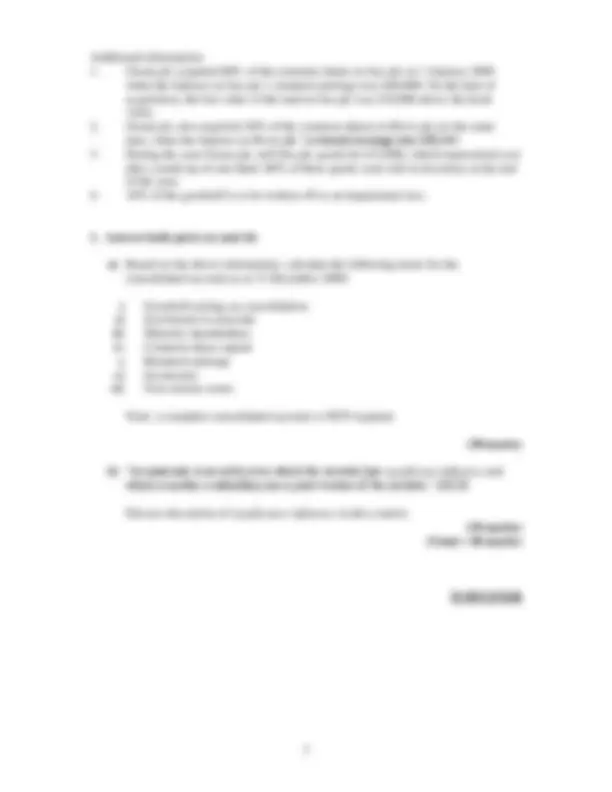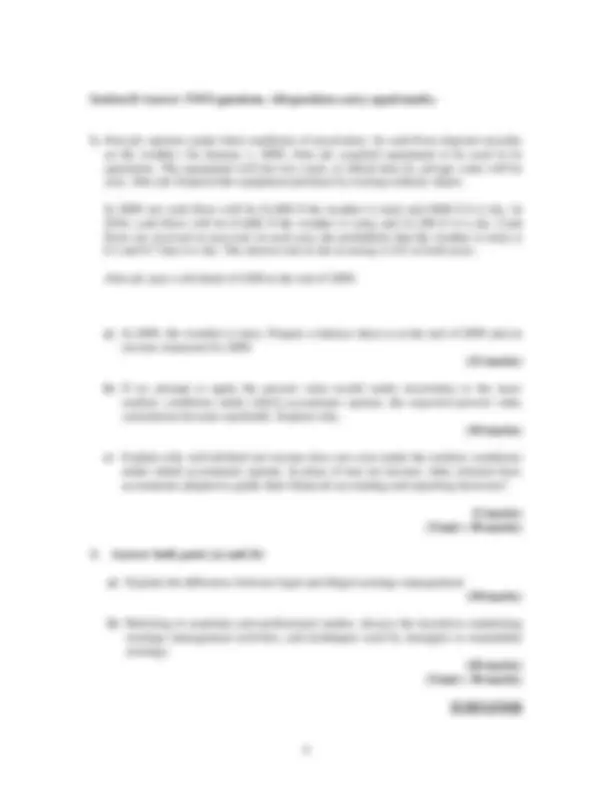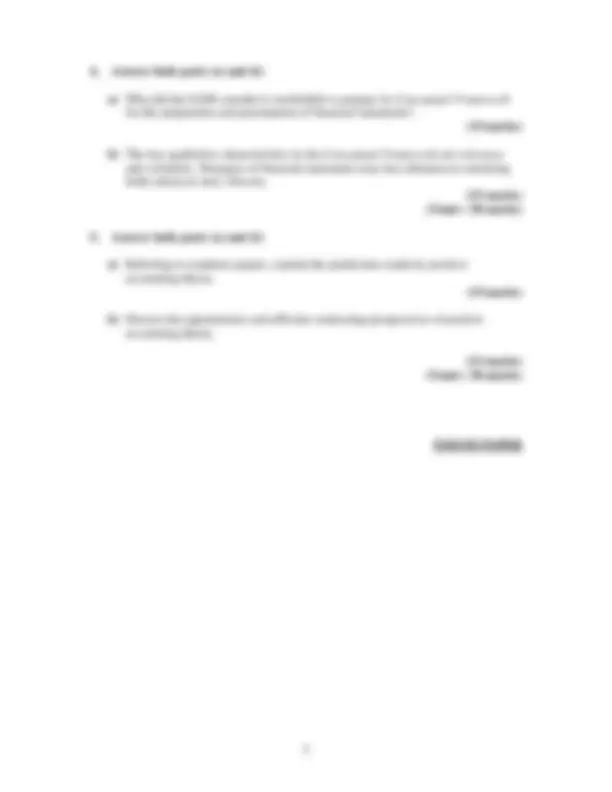





Study with the several resources on Docsity

Earn points by helping other students or get them with a premium plan


Prepare for your exams
Study with the several resources on Docsity

Earn points to download
Earn points by helping other students or get them with a premium plan
Community
Ask the community for help and clear up your study doubts
Discover the best universities in your country according to Docsity users
Free resources
Download our free guides on studying techniques, anxiety management strategies, and thesis advice from Docsity tutors
Goodwill, Financial Statements, Trade Debtors, Current Account, Cash at Bank, Common Share Capital, Retained Earnings, Trade Creditors, Tax Payable, Equity and Liabilities. Given points represent accounting and finance exam paper.
Typology: Exams
1 / 5

This page cannot be seen from the preview
Don't miss anything!




Mai / Mehefin 2011 May / June 2011
Time allowed: THREE hours
ANSWER THE COMPULSORY QUESTION IN SECTION A AND TWO QUESTIONS FROM SECTION B
Casio FX83ES or FX85ES calculators only may be used.
The following are the financial statements of the parent company, Ocean plc, a subsidiary company, Sea plc, and an associate company, River plc, for the accounting year-end 31 December 2009.
Ocean plc
Sea plc
River plc £ £ £ ASSETS
Non-current assets (including land) 172,800 158,400 113,
Investment in Sea plc 201, Investment in River plc 57, Current Assets: Inventories 172,800 86,400 51, Trade Debtors 187,200 100,800 51, Current account - Sea plc 21, Current account - River plc 4, Cash at bank 34,560 10,080 8, Total Assets 852 , 480 355 , 680 226 , 080
Common share capital 360,000 86,400 72, Additional paid-in capital 43,200 28,800 17, Retained Earnings 216,000 172,800 72, 619,200 288,000 161,
Current Liabilities Trade Creditors 190,080 36,000 48, Tax payable 43,200 10,080 11, Current account - Ocean plc 21,600 4,
Total equity and liabilities 852 , 480 355 , 680 226 , 080
Section B Answer TWO questions. All questions carry equal marks.
2. Aber plc operates under ideal conditions of uncertainty. Its cash flows depend crucially on the weather. On January 1, 2009, Aber plc acquired equipment to be used in its operations. The equipment will last two years, at which time its salvage value will be zero. Aber plc financed the equipment purchase by issuing ordinary shares.
In 2009, net cash flows will be £2,800 if the weather is rainy and £800 if it is dry. In 2010, cash flows will be £3,600 if the weather is rainy and £1,200 if it is dry. Cash flows are received at year-end. In each year, the probability that the weather is rainy is 0.3 and 0.7 that it is dry. The interest rate in the economy is 6% in both years.
Aber plc pays a dividend of £200 at the end of 2009.
a) In 2009, the weather is rainy. Prepare a balance sheet as at the end of 2009 and an income statement for 2009. (15 marks)
b) If we attempt to apply the present value model under uncertainty to the more realistic conditions under which accountants operate, the expected present value calculations become unreliable. Explain why. (10 marks)
c) Explain why well-defined net income does not exist under the realistic conditions under which accountants operate. In place of true net income, what criterion have accountants adopted to guide their financial accounting and reporting decisions?
(5 marks) (Total = 30 marks)
3. Answer both parts (a) and (b)
a) Explain the difference between legal and illegal earnings management. (10 marks)
b) Referring to academic and professional studies, discuss the incentives underlying earnings management activities, and techniques used by managers to manipulate earnings. (20 marks) (Total = 30 marks)
TURN OVER
4. Answer both parts (a) and (b)
a) Why did the IASB consider it worthwhile to prepare its Conceptual Framework for the preparation and presentation of financial statements? (15 marks)
b) The key qualitative characteristics in the Conceptual Framework are relevance and reliability. Preparers of financial statements may face dilemma in satisfying both criteria at once. Discuss. (15 marks) (Total = 30 marks)
5. Answer both parts (a) and (b)
a) Referring to academic papers, explain the predictions made by positive accounting theory. (15 marks)
b) Discuss the opportunistic and efficient contracting perspectives of positive accounting theory.
(15 marks) (Total = 30 marks)